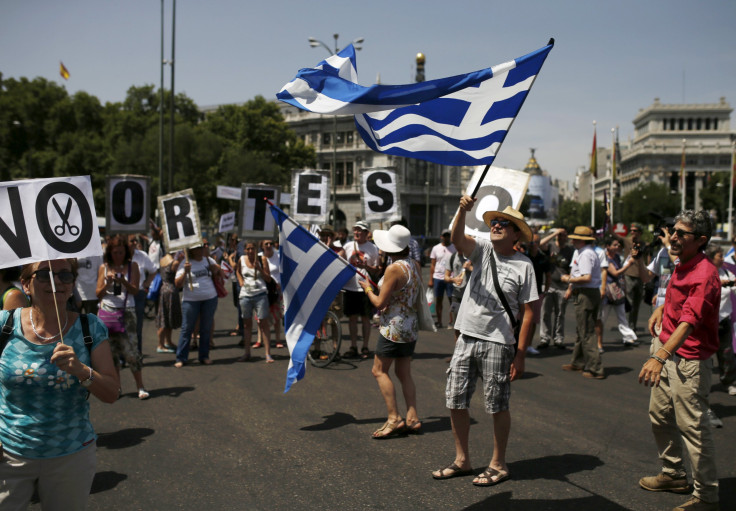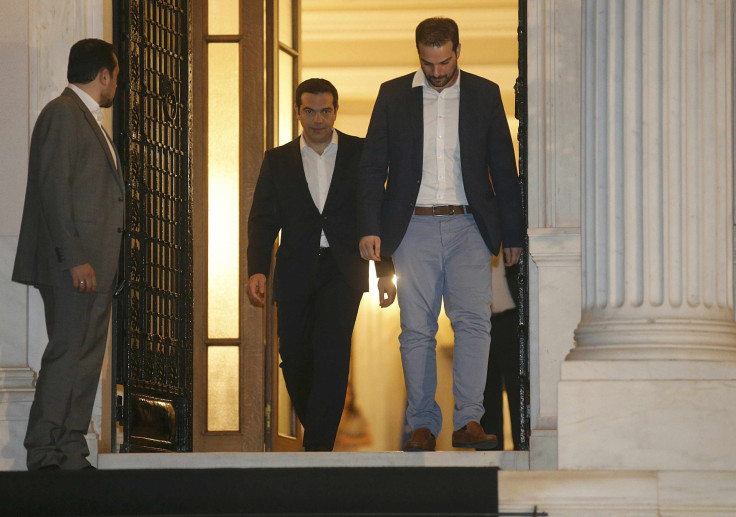Greek Referendum 2015: Greek Voters Reject Bailout Offer, Vote ‘No’ On Creditors’ Demands

The final tally is in and an overwhelming majority of Greeks voted against the austerity demands of international creditors, a landslide result for the leftist government. With 92 percent of the vote counted, Greeks rejected the bailout terms 61 percent to 39 percent, the Interior Ministry said.
Economists have warned a "no" vote could lead to Greece exiting the eurozone. However, Greek Prime Minister Alexis Tsipras said Sunday the “no” vote is not a mandate to clash with Europe, and the country is ready to continue negotiating with a plan of reforms.
"With the difficult circumstances prevailing today you made a very brave choice," Tsipras said in a televised address to Greeks. "I'm fully aware the mandate you gave me is not one of a rupture with Europe but a mandate to strengthen our negotiating position to seek a viable solution."
Today's #referendum doesn't have winners or losers. It is a great victory, in and of itself. #Greece #Greferendum
— Alexis Tsipras (@tsipras_eu) July 5, 2015Even in the most difficult circumstances, #democracy can't be blackmailed—it is a dominant value and the way forward. #Greece #Greferendum
— Alexis Tsipras (@tsipras_eu) July 5, 2015I want to thank each and every one of you. Regardless of how you voted, tonight we are all one. #Greece #Greferendum
— Alexis Tsipras (@tsipras_eu) July 5, 2015The mandate you've given me does not call for a break with Europe, but rather gives me greater negotiating strength. #Greece #Greferendum
— Alexis Tsipras (@tsipras_eu) July 5, 2015We know that there are no easy solutions. But there are just solutions, viable solutions. As long there's willingness on both sides. #Greece
— Alexis Tsipras (@tsipras_eu) July 5, 2015The Greek people made a historic and brave choice. Their response will alter the existing dialogue in Europe. #Greece #Greferendum
— Alexis Tsipras (@tsipras_eu) July 5, 2015The Greek ppl responded to real question at hand: What kind of Europe do we want? The answer: A Europe of solidarity & #democracy. #Greece
— Alexis Tsipras (@tsipras_eu) July 5, 2015Our immediate priority is to restore our banking system's functioning & economic stability. #Greece
— Alexis Tsipras (@tsipras_eu) July 5, 2015The issue of our debt will now be on the negotiating table, in light of the IMF's recent report on its sustainability. #Greece
— Alexis Tsipras (@tsipras_eu) July 5, 2015The "no" vote sent the euro lower, falling 1.6 percent to $1.0963 in electronic trading before the opening of the Asian markets, Agence France-Presse reported.
Tsipras has maintained a vote against the creditors' reform proposals -- pension cuts and tax hikes -- would allow him to renegotiate with the country’s creditors in a stronger position. The result, he said, would be a new bailout deal with better terms.

The international creditors, however, have said they are unwilling to renegotiate. If that’s true, Greece risks an exit from the eurozone. Athens defaulted on its debt payment of 1.6 billion euros ($1.8 billion) to the International Monetary Fund Tuesday, risking the country’s place in the eurozone and sparking concerns Greece may exit the 19-member currency bloc.
Eurogroup finance ministers plan to meet to discuss the outcome of the Greek referendum, said Michel Reijns, a spokesman for chairman Jeroen Dijsselbloem. The meeting is expected to take place later this week.
I have called a #EuroSummit Tuesday evening at 18h to discuss situation after referendum in #Greece
- Donald Tusk (@eucopresident) July 5, 2015The EU's Jean-Claude Juncker scheduled a conference call with European Council President Donald Tusk, the ECB's Mario Draghi and Eurogroup's Jeroen Dijsselbloem Monday. France and Germany called for an emergency meeting among eurozone leaders. German Chancellor Angela Merkel and French President Francois Hollande conferred by phone and planned to meet in Paris Monday ahead of the session called by Tusk for Tuesday, Reuters reported.
After last-ditch negotiations between Athens and its European creditors broke down last weekend, Greece imposed so-called capital controls this week on fears Greek citizens would withdraw all their cash and stash it under mattresses.
The controls include daily limits on cash withdrawals and restrictions on monetary transfers and overseas credit card payments to prevent euros from flowing out of Greek banks. ATM withdrawals are limited to 60 euros ($66) a day for this period and Greeks cannot transfer money to accounts abroad.
Greece was renegotiating the terms of its $270 billion bailout program following January's election victory of the far-left Syriza Party. Before the national elections, the Syriza Party, led by Tsipras, had staged a revolt against the budget cuts and other austerity measures mandated under the bailout. The previous conservative government of Greece had agreed to those bailout terms.
Talks between Greece and its international creditors have stalled multiple times in the last four months. Greece struck a deal with the European Union in February to get 7 billion euros ($8 billion) in extra bailout funds in exchange for economic reforms. The deal specified the funds would not be released until Tsipras’ leftist government submitted reform plans that were approved by the “troika,” -- the International Monetary Fund, the European Central Bank and the European Commission.
© Copyright IBTimes 2024. All rights reserved.












